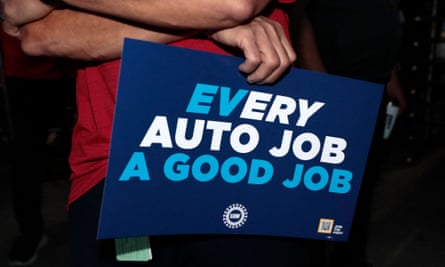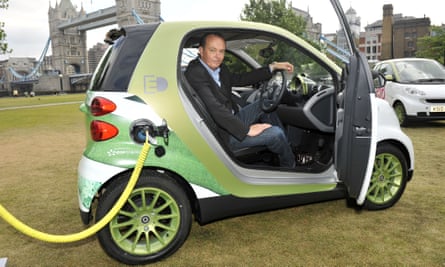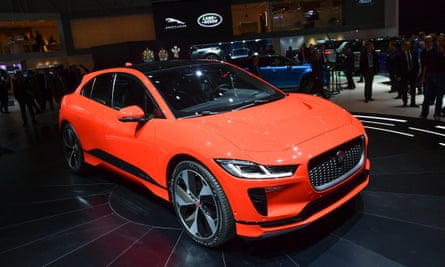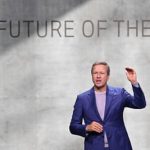
Three pickup trucks lined up on a highway in front of a Tesla in Phoenix, Arizona, to form a rolling roadblock. The Tesla driver, a computer scientist, moved lane to wait for them to let him past. What came next was unexpected: a video on social media from the incident in June shows a belch of acrid black smoke from the engine of one of the trucks, enveloping the electric car following behind.
The Tesla driver had been caught by a “rolling coal”, a deliberate modification of a diesel engine to increase the engine’s horsepower – while also dramatically increasing pollution. It is also illegal: Sinister Diesel, one of the companies selling “defeat devices” used to roll coal, agreed to pay a $1m (£780,000) fine this week for breaking environmental laws.
It was not a one-off. Since at least 2014 rolling coal has become a symbol of dirty protest against the rise of electric vehicles (EVs). Around the world, the electric car has been caught up in the culture wars, as tensions grow around the shift from the era of fossil fuels to net zero carbon emissions.
 View image in fullscreenA video from a Tesla Model 3 driver showing the fumes from three trucks in Phoenix, Arizona. Photograph: @NateWiki
View image in fullscreenA video from a Tesla Model 3 driver showing the fumes from three trucks in Phoenix, Arizona. Photograph: @NateWiki
Those tensions are multifaceted: they range from concerns about the cost of upgrading from petrol and diesel to battery power; to fears about automotive job losses from Detroit in Michigan to Coventry in the West Midlands; to “range anxiety” – how far an EV can travel on a charge; to China’s rise as an EV superpower; to the car as a symbol of personal freedom akin to the second amendment right to bear arms in the US.
Electrification is vital. Road transport accounts for 15% of global carbon emissions that need to be cut to zero by 2050 to prevent global heating reaching catastrophic levels. It will also helpfully reduce particulate emissions, improving air quality and cutting disease in smoggy cities. But the scale of the challenge is vast.
Taking my Model 3 out on a road trip and these 3 a**holes form a blockade in front of me and send all their fumes my direction. This should be illegal. Really wish I had a HEPA air filter right now…@WholeMarsBlog @jff024 @TheTeslaHoe @ValueAnalyst1 @DirtyTesLa @kylaschwaberow… pic.twitter.com/1X14rm3NuH
— Nathan (@NateWiki) June 7, 2023
“There is an underlying trend of the EV being weaponised as a political tool,” says Andy Palmer, a former head of the luxury carmaker Aston Martin – itself wrestling with the shift from hydrocarbons to electrons – and now the interim leader of car charger company Pod Point. “It has become a political football.”
There is an underlying trend of the EV being weaponised as a political toolAndy Palmer
Politicians, newspapers and TV presenters from the right in particular are drawing battle lines that crudely divide the supposedly eco-conscious wealthy in their electric cars (and trains) from the hard-pressed working-class in their cheap but essential petrols and diesels.
Car tribalism could be back in the White House soon. In the US Donald Trump last week told a crowd in the US automotive heartland of Michigan that President Joe Biden wanted to “decimate” the industry by pushing for two-thirds of US sales to be electric by 2032. But the dividing lines are blurred: few have done more damage to the combustion engine’s cause than Tesla’s chief executive, Elon Musk, a hero of the libertarian right.
 View image in fullscreenElon Musk in Shanghai in 2020. The Tesla chief executive is a hero of the libertarian right. Photograph: Aly Song/Reuters
View image in fullscreenElon Musk in Shanghai in 2020. The Tesla chief executive is a hero of the libertarian right. Photograph: Aly Song/Reuters
The battle has reached Downing Street. The UK is undergoing a pre-election spasm of car politics after a Conservative candidate narrowly defended the former seat of the ex-prime minister Boris Johnson in Uxbridge, north London. Steve Tuckwell’s campaign focused on cancelling the extension of the capital’s ultra-low emission zone (Ulez), a policy of the Labour mayor, Sadiq Khan, that will result in drivers of older petrol and diesel cars being charged £12.50 to enter the capital from the end of August.
Johnson introduced Ulez as mayor, and brought in the 2030 ban on the sale of new petrol and diesel cars as prime minister. Yet his one-time ally and successor, Rishi Sunak, last month gave only tepid support to the ban, and senior Tories considered a U-turn before eventually acknowledging the policy would not change – although some changes to intermediate sales targets may come. Sunak has pivoted away from electric cars to argue he was on the side of motorists – in an effort to pit himself against “anti-motorist” Labour. (His only intervention appears to be a woolly review of “low-traffic neighbourhoods”, raising the prospect of Westminster deciding on bollard placement around the country.)
 View image in fullscreenThe protest against the Ulez in London has become highly politicised. Photograph: Martin Pope/Getty Images
View image in fullscreenThe protest against the Ulez in London has become highly politicised. Photograph: Martin Pope/Getty Images
In France the far-right Marine Le Pen seized on the gilets jaunes (yellow vests) movement against Emmanuel Macron – which started as a protest about fuel duty increases, while in Germany coalition politics was briefly roiled by the Free Democratic party’s successful push for a loophole that would allow the continued sale of petrol and diesel cars as long as they use net zero efuels that are made using carbon captured from the air.
Cars and the roads have always been “very contested objects” and status symbols for owners, says Yunis Alam, the head of sociology at the University of Bradford and the author of Race, Taste, Class and Cars. That ranges from working-class owners adding spoilers as a form of self-expression, to the limos of the wealthy (and the middle classes’ studied indifference in between).
“Most of the world now is governed by the car,” says Alam, and “at the moment it seems to have found itself in this ‘culture war’ space”.
Most of the world now is governed by the car and at the moment it seems to have found itself in this ‘culture war’ spaceYunis Alam
“It’s very short term, and it’s very political with a small ‘p’,” he says. “Cars tie in to our sense of liberty and freedom,” making them attractive to the purveyors of rightwing politics. However, he disputes whether that truly is the sole domain of the political right, arguing the UK government is insincerely appropriating leftwing discourse about equality and concern for the less wealthy.
There is certainly some cause for concern when it comes to jobs. The nature of the electric car, which has far fewer components than its fossil fuel cousin, will change the shape of the industry. Fewer parts mean they take less human intervention: 3.7 hours of labour compared with 6.2 for a petrol car, according to consultancy Alix Partners. They also break down less often, likely requiring fewer mechanics.
The mighty German automotive industry employed 460,000 people in 2022, many of whose jobs are tied to producing petrol and diesel models. In the US there are 1 million car factory workers, while in the UK there are 172,000. They could lose out to Chinese manufacturers, which have taken a lead in electric vehicles and dominate battery manufacturing.
 View image in fullscreenUnited Auto Workers supporters outside the Stellantis assembly plant in Sterling Heights, Michigan. Many US auto workers fear the loss of their jobs. Photograph: Jeff Kowalsky/AFP/Getty Images
View image in fullscreenUnited Auto Workers supporters outside the Stellantis assembly plant in Sterling Heights, Michigan. Many US auto workers fear the loss of their jobs. Photograph: Jeff Kowalsky/AFP/Getty Images
There is also a vocal pro-petrol lobby among politicians.
In the UK the former cabinet minister Jacob Rees-Mogg this week wrote that Ulez was designed “to stop the young and poor from driving”.
“I do not think people should be made to buy electric cars by taxes and bans,” says John Redwood, a Conservative MP who regularly inveighs against the UK’s 2030 ban, by email. He is a member of the Net Zero Scrutiny Group of MPs campaigning against policies to lower carbon emissions.
skip past newsletter promotion
Sign up to Business Today
Free daily newsletter
Get set for the working day – we’ll point you to all the business news and analysis you need every morning
Enter your email address Enter your email address Sign upPrivacy Notice: Newsletters may contain info about charities, online ads, and content funded by outside parties. For more information see our Privacy Policy. We use Google reCaptcha to protect our website and the Google Privacy Policy and Terms of Service apply.
after newsletter promotion
“The industry needs to improve the product ranges on offer in the usual way so many more people want them and can afford them,” he says. “People are not forced or persuaded by government action to buy smartphones, pads and laptops. They just want them and find the purchase cost.”
Electric car sales chart
However, there is evidence that the consumer shift is well under way, with EVs still selling almost as fast as they can be made. Quentin Willson argues that EV adoption is only going one way. He was previously a paid-up petrolhead, presenting the BBC’s Top Gear for a decade and he still owns a 1964 Ford Mustang V8 muscle car. Willson previously co-founded the FairFuel campaign with Howard Cox, a lobbyist who is now running for London mayor to try to scrap Ulez in a party initially founded by Nigel Farage.
It’s a faux culture war. The hysteria around loss of freedom is totally misplacedQuentin Willson
“I’ve come from the dark side,” jokes Willson, who now leads FairCharge, a group campaigning for more pro-EV UK policies. (Willson has claimed former colleague Jeremy Clarkson called him a “twat” for promoting electric cars early on.) But he believes the divide between pro and anti-electric vehicles is contrived.
“It’s a faux culture war,” he says. “The hysteria around loss of freedom is totally misplaced. We’ve a minority of vociferous voices who’ve never driven an electric car and don’t like the idea.”
 View image in fullscreenFormer Top Gear presenter Quentin Willson now leads FairCharge, a group campaigning for more pro-EV UK policies. Photograph: Ray Tang/Rex Features
View image in fullscreenFormer Top Gear presenter Quentin Willson now leads FairCharge, a group campaigning for more pro-EV UK policies. Photograph: Ray Tang/Rex Features
What is real, though, is the financial aspect of the transition. The upfront cost difference is marked: a new Mini electric starts at £32,550, while the petrol equivalent is almost £10,000 cheaper. The coronavirus pandemic caused shortages of new cars, which has prevented prices from dropping as expected. That means it is still impossible for some car owners to upgrade (even if the total cost of ownership can be cheaper, depending on electricity prices). People in cities who do not have off-street parking will also struggle with electric car ownership until charger numbers improve dramatically.
There is also the small matter of the billions of pounds, dollars and euros in taxes raked in by fuel taxes around the world. Replacing those revenues has proven a tricky problem for governments. They have mostly preferred to ignore the problem, although it is likely that road pricing will become common, once politicians have grasped the nettle.
Mandates and bans chart
“The reality has started to hit home now” that the industry is not quite ready for bans on petrol and diesel sales, said Ginny Buckley, the chief executive of Electrifying.com, a British EV buying website. “I get a sense that a lot of this policy wasn’t thought through. It was a relatively easy win.”
In many countries there has not been a proper reckoning of the costs of the transition, and who will pay for them. Norway offers one model, with more electric cars a head than anywhere else in the world. But that model has received heavy purchase subsidies (funded by oil wealth, no less), a route that other countries are wary of because of the cost.
Yet Buckley also gets frustrated at how the debate plays out in cartoonish terms. “There is some truth in it but what’s lacking is the context,” she says.
Some parts of the car industry are still holding out for later bans – although others such as the UK’s JLR, which makes Jaguars and Land Rovers, say it is too late for them to change course dramatically. Palmer is one of the few leaders in the electric car industry who thinks the UK’s 2030 ban should be delayed – arguing that going ahead of the EU (which has a 2035 deadline), whose carmakers control most of the UK industry, will not be viable. But either way, he argues that the tribal nature of the debate is harmful.
 View image in fullscreenIan Callum designed the Jaguar I-Pace, which was awarded European car of the year 2019. Photograph: Fabrice Coffrini/AFP/Getty Images
View image in fullscreenIan Callum designed the Jaguar I-Pace, which was awarded European car of the year 2019. Photograph: Fabrice Coffrini/AFP/Getty Images
Ian Callum first started working seriously on electric cars in 2010, as design head of Jaguar. He designed the richly garlanded Jaguar I-Pace electric SUV and drives both electric cars and gas-guzzling sports cars. He acknowledges there is likely to be debate over the electric car for some time to come because they are still costly, for now, and the lack of chargers in many places means they are inconvenient.
But in the longer term he is convinced that the polarised “baddies and goodies” atmosphere will diminish as electric cars become mainstream.
“I really believe in time, as technology and the convenience of it catches up, it’ll become the power of choice,” he said. “Most people don’t really care what they drive. It’s about the convenience of the power that’s the issue.”


